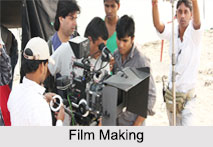 Film is a term that encompasses motion pictures as individual projects, as well as the field in general. The origin of the name pertains to the fact that photographic films, also called Film Stock, have historically been the primary medium for recording and displaying motion pictures. They are a strip or sheet of transparent plastic film base coated on one side with a gelatin emulsion, containing microscopically small light-sensitive silver halide crystals. Films are produced by recording actual people and objects with cameras, or by creating them using animation techniques and/or special effects. They comprise a series of individual frames, but when these images are shown rapidly in succession, the illusion of motion is given to the viewer. Flickering between the frames is not visible due to an effect known as persistence of vision - whereby the eye retains a visual image for a fraction of a second after its source has been removed and replaced with that of the next image in sequence.
Film is a term that encompasses motion pictures as individual projects, as well as the field in general. The origin of the name pertains to the fact that photographic films, also called Film Stock, have historically been the primary medium for recording and displaying motion pictures. They are a strip or sheet of transparent plastic film base coated on one side with a gelatin emulsion, containing microscopically small light-sensitive silver halide crystals. Films are produced by recording actual people and objects with cameras, or by creating them using animation techniques and/or special effects. They comprise a series of individual frames, but when these images are shown rapidly in succession, the illusion of motion is given to the viewer. Flickering between the frames is not visible due to an effect known as persistence of vision - whereby the eye retains a visual image for a fraction of a second after its source has been removed and replaced with that of the next image in sequence.
Film and filmmaking is considered by many to be an important art form; films entertain, educate, enlighten and inspire audiences. The visual elements of cinema need no translation whatsoever, giving the motion picture a universal power of communication. Any film can become a worldwide attraction, especially with the addition of dubbing or subtitles that translate the dialogue in different languages. Films are also artefacts created by specific cultures, reflecting those cultures and, in turn, affecting them as well. Films have an infallible characteristic of connecting with their audience.
The art of filmmaking production cycle consists of 5 main stages:
1. Development: The Development stage of filmmaking lays the very base of a prospective motion picture, wherein an idea is fleshed out into a viable script. The producer/director of the movie will establish a story, which may be inspired from books, other films, true stories, original fictional/non-fictional ideas, etc. and express it in a detailed script encompassing complete scenes, together known as Screenplay.
2. Pre-production: The pre-production is a crucial stage wherein the film is prepared to be shot in camera, involving multiple steps pertaining to different aspects such as film budget, logistics, locations and sets, sound design and music, etc. The entire production is also storyboarded and visualized with the help of illustrators and concept artists.
3. Production: The production stage is wherein the film is actually shot or captured in the camera, with the work of actors, choreographers, cinematographers and the crew members, all under the supervision of the film"s director.
4. Post-production: The film actually shot is completed into a proper motion picture in the post-production stage. The process involves editing of scenes, background score, visual effects etc.
5. Distribution: The final step in filmmaking, distribution is concerned with the business perspective of film making, encompassing duplication of the film as required for theatrical distribution, development and circulation of press kits, posters and other advertising materials, promotion with press releases, interviews, showings at a press preview, launch party, premiere night, social media promotion, teasers and trailers, before the actual decided feasible date of release of the film.
An entire film production cycle has typically 3 phases - the first phase being development, the second comprising pre-production and production and the final involving post-production and distribution functions.






